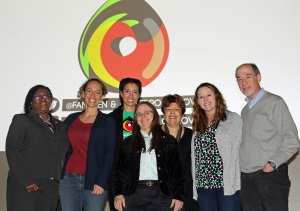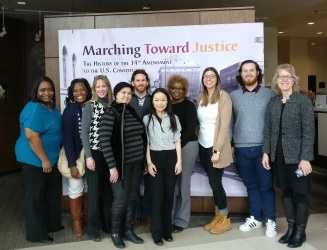News and Activities

On Feb. 27, Jana McNair joined the School of Social Work as director of philanthropy. Jana returns to Wayne State University with more than 18 years of experience as a professional fundraiser. Most recently, Jana served as vice president and consultant with Ruffalo Noel Levitz, whose technology-enabled enrollment and fundraising services have been used by more than 3,000 colleges and universities and numerous nonprofit clients worldwide. In that role, Jana managed a portfolio of relationships with top-tier organizations (mainly universities) to build comprehensive fundraising programs. Prior to Jana’s role with Ruffalo Noel Levitz, she was with Wayne State for eight years, during which she served as director of annual giving as well as assistant director of development with the College of Fine, Performing and Communication Arts. Jana can be reached at bb3074@wayne.edu.

On Feb. 15, On Feb. 15, the Wayne State School of Social Work brought to the Community Arts Auditorium “One Drop Of Love,†the multimedia one-woman show by Fanshen Cox DiGiovanni (second from the left above) exploring the intersections of race, class and gender. An award-winning actor, producer and educator, Cox DiGiovanni used filmed images, photographs, and animation to describe her lifelong search for roots, identity, and justice. Chronicling the evolution of the U.S. Census’ racial categories, her parents’ interracial marriage, her political and social activism, and her experiences in Africa with the Peace Corps, Cox DiGiovanni explained how her racial identity has simultaneously been determined for her and subject to her own interpretation. View our press release for more information on this event.
Deborah K. Padgett, professor of social work and public health at New York University, delivered the 2017 Social Work and Anthropology (SWAN) lecture on “Theory & Method Matters: Finding the Right Combination†on Feb. 15. Speaking at Wayne Law’s Spencer M. Partrich Auditorium, Padgett discussed the need for more research describing the mechanisms through which structural factors such as economic and social inequalities affect people on a daily basis. She urged increased scholarship focusing on the interaction of what she termed “upstream†determinants of health such as economic and social policies and “downstream†determinants such as biology and behavior. For additional information on this event view our press release here.

On Feb. 10, Wayne State University Law School hosted an interprofessional workshop for graduate students aimed at reducing health disparities, titled “Integrated Care: Graduate Students Understanding Healthcare Professionals' Roles, Responsibilities, and Philosophies to Impact Better Health Outcomes Together.†Students and speakers were invited from Law, Nursing, and Social Work. The workshop began with opening remarks by Wayne Law’s Dean Lance Gable, followed by presentations from Takisha LaShore (above, far left), Nancy George (Nursing) and Kathryn Smolinski (Law) on their respective professions’ philosophies around client care. The 20 participating students then were divided into small interprofessional groups to conduct a mock client interview. The day concluded with a large group discussion about how the students felt about integrated healthcare and whether their perceptions about the other professions have changed after this workshop. The workshop was the product of five months of planning by the three schools, with key assistance from M.S.W. student Stephanie Yan Xuan (above, center). Also pictured below is Joy Ernst, far right.
On Sunday January 22, St. Paul’s Cathedral held its Annual Meeting, which included a few select recognitions via Cathedral Commendations. This year, the CHIPS project was recognized for providing interdisciplinary service to the homeless. Cassandra Bowers works on this interdisciplinary team project consisting of Medicine (Dr. Jennifer Mendez), Pharmacy (Dr. Justine Gortney) and Social Work. Through this initiative, students provide medical and social support to improve the quality of health of persons experiencing homelessness, while gaining key competencies. These include engaging marginal populations within the community, learning how to work in interprofessional teams, and analyzing the impact of the urban context on a range of client systems. Dr. Bowers’ role in this project is acting as a supervisor/preceptor for students involved in the project, which began in 2014.